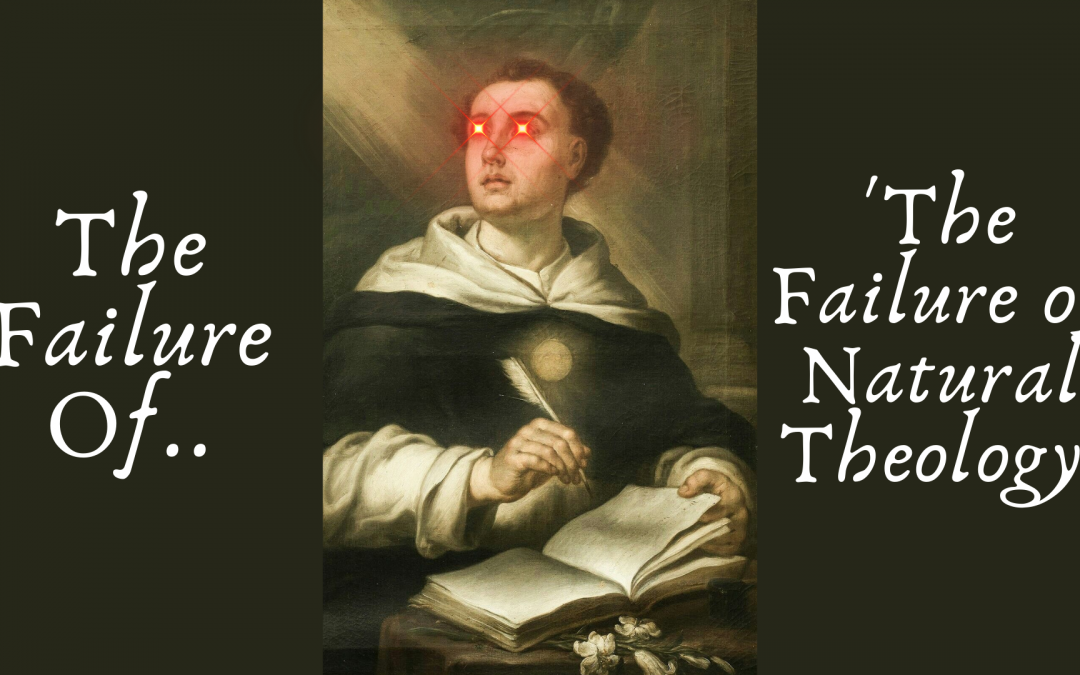
A Response to Dr. Sam Waldron
It is never a good day to disagree with Dr. Sam Waldron. In spite of our disagreements, I have leagues-worth of respect for this man, and have no desire to enter into any unnecessary disputation, especially by bringing up an article from 2019 on the Covenant Baptist Theological Seminary website. However, Waldron republished the article and, apparently, shared it in light of the current debate centered around natural theology. This debate revolves around two distinct subjects which must remain distinct however related they most certainly are. The preeminent issue is the doctrine of God. The second is natural theology. Waldron’s article largely addresses the latter. Though, I am concerned because it seems as if the contemporary rejection of natural theology has more to do with some of the persons by which it was taught, a la., Thomas Aquinas. Such a vein of rejection tends to rot other concepts and categories, and the doctrine of God seems to be the first victim of the disease. Eventually, the attributes of Scripture, the Person and natures of Christ, the work of Christ, and ecclesiology will likewise fall under the revisionist blade—perhaps in the next generation or two.
In this article, I am going to interact with Thomas extensively, but only because this is the target of Waldron’s article, and also because there is some undue identification of Thomas with the issues at hand. Thomas is not the face of classical theism. But contemporary discussion appears to be leveling criticism at classical theism for Thomas’ sake. And this is no bueno. As I’ve said before, if I had to choose between giving someone Thomas or giving someone Francis Turretin, I’d give them the latter. I also would not give the young Christian a copy of the Summa Theologiae. For this reason, it is unfortunate that critics of classical theism have come at this issue because of and through Thomas Aquinas. Because now the debate revolves around a historical person and not the facts of the matter. And as such, defense of the facts are misunderstood to be defense of the persons who teach them. It’s a mess.
It appears there are three main building blocks holding up Waldron’s article. They are:
- Thomas’ alleged rejection of God’s self-evident existence
- Thomas’ “imperfect” view of total depravity
- Irreconcilable differences between Calvin and Aquinas
I want to say at the outset that Thomas is not my object of defense. But unfortunately, the person and the concepts he represents have become so tightly intertwined that it would be almost irresponsible to avoid using his name. He is not “he-who-shall-not-be-named” after all, though some may think so. And there are some misunderstandings of Thomas (understandably so) which lead Waldron to oppose Calvin and Thomas in places they perhaps should not be opposed. I want to make it clear that I am not trying to cop-out by accusing Waldron of “misunderstanding.” Nor am I trying to gaslight the man. Thomas is not 200, not 400, but 800 years removed from us, and his writings are translated out of Latin. So, there are cultural, linguistic, and philosophical chasms to overcome; not only between us and him, but even between him and Calvin—who lived almost 300 years after.
With that said, we should all approach the evidence circumspectly.
Thomas’ Alleged Rejection of God’s Self-Evident Existence
Waldron writes:
I procured and then scoured the relevant sections of his Summa Contra Gentiles and Summa Theologica. This reading caused considerable expansion of that lecture. It actually—in fact—expanded it into two lectures. What it did not do, however, was significantly change my understanding of Thomas Aquinas “Classical Apologetics” at all. I concluded that basically Van Til’s presentation of Thomas was right.
Here’s one of the first issues with the article, one that may account for some of the wrong assumptions made later on about what Thomas actually believed. It is very difficult to read “relevant” sections of Aquinas and come away with an accurate characterization of what he believed on any one particular topic. This is because Thomas was in the habit of making distinctions—something emphasized in the scholastic milieu he found himself in. So, what he affirms in one place may be distinguished into two or more senses or species in another, some of which he might affirm. It is, to that effect, not a reference work. While his 13th century students would have expected this feature of his work, we less so today. One such place Waldron runs into trouble relates to the notion of “self-evidence.” He writes:
Aquinas denies that the existence of God is self-evident in both his Summa Theologica and in his Summa Contra Gentiles and rejects the above arguments. The five proofs are built, then, upon the denial of any innate knowledge of God.
I have no idea what Waldron did and did not read, but as mentioned above Thomas makes distinctions. And “self-evidence,” for Thomas, must be distinguished into two senses. In his article, Waldron attempts to understand Thomas’ thought by looking at Thomas’ characterization of objections instead of exploring how Thomas answered those objections; and then, he defers to Gordon Clark—a spurious secondary source at best. I will not deal with Clark here because that will do nothing but complicate the discussion. We are trying to understand classical theism, and now we’re trying to understand Thomas’ articulation of it—it would be a shame if we now had to try and understand Gordon Clark’s understanding of Thomas!
Waldron apparently confuses the notion of self-evidence with innate knowledge, claiming that Thomas, in denying self-evidence, automatically(?) denies innate knowledge of God. But this largely takes for granted a definition of what self-evidence even is.
As mentioned, Thomas believed there are two ways in which a thing can be “self-evident.” “A thing,” he says, “can be self-evident in either of two ways: on the one hand, self-evident in itself, though not to us; on the other, self-evident in itself, and to us (Summa Theologiae, I, Q. 2, At. 1).” But we have to remember what Thomas thought self-evidence was. By way of explanation, he says, “No one can mentally admit the opposite of what is self-evident; as the Philosopher states concerning the first principles of demonstration. But the opposite of the proposition ‘God is’ can be mentally admitted: ‘The fool said in his heart, There is no God’ (Ps. 52:1). Therefore, that God exists is not self-evident.”
When Thomas speaks of “self-evidence” he speaks of linguistic propositions, i.e. “God exists,” which may or may not be understood, but he does not subsume all knowledge under “propositional.” Much like one may reject an articulation of the formal laws of logic, they nevertheless “know” those laws through everyday employment of them. They know logic through implication, but not necessarily through inference (because they cannot be demonstrated). In that sense, the laws of logic are not “self-evident” to us, because we may not understand them propositionally. But that does not mean the laws of logic are not “self-evident” in themselves. Liberty is said to be “self-evident” in our Declaration of Independence. But it is not self-evident in that it cannot be rejected as a mental proposition (just look at our government!), but it is self-evident in and of itself.
For the medieval (and Reformed) scholastics, the knowledge situation wasn’t reduced to mental propositions. And this is why Thomas can say in the next two paragraphs, “To know that God exists in a general and confused way is implanted in us by nature, inasmuch as God is man’s beatitude.” Interestingly, he also admits of the corruption of this knowledge when he says, “for many there are who imagine that man’s perfect good which is happiness, consists in riches, and others in pleasures, and others in something else.” Thus, man has a confused knowledge of God implanted in them because though they see the contours, they apply those contours to idols instead of glorifying God as God (Rom. 1:21).” Concerning the exegesis of Romans 1, Waldron further notes:
Listen to his argument in Summa Theologica Question 2, Article 2: “The Apostle says: ‘The invisible things of Him are clearly seen, being understood by the things that are made’ (Rm. 1:20). But this would not be unless the existence of God could be demonstrated through the things that are made; for the first thing we must know of anything is whether it exists.” Thomas takes (and the surrounding context of his assertion simply emphasizes this) Romans 1:20 to mean that the existence of God is not self-evident or implanted in man, but can be demonstrated.
We have to understand Thomas’ project. He’s writing what amounts to a systematic theology which means it proceeds discursively by nature. His proofs are largely in service of that effort. Thus, there is language in Thomas regarding the need to “demonstrate” God’s existence. But he did not think anyone and everyone needed to demonstrate God in order to know God. The simple, he thought, were justified in knowing Him through faith alone. And even the wicked, as we’ve seen, has an imperfect knowledge of God in and through the world—not because they performed an argument, but because they’ve inferred God’s existence through what has been made, both in himself (innately) and through the world (acquiescently). Francis Turretin and others would later term this “innate/acquired” knowledge.
In Romans 1:18-20, there are two types of knowledge mentioned, one innate (intuited) and another acquired through the works of God. Both Francis Turretin and Thomas Watson include both of these general “ways” of knowing God in their work. And many more names could be added to that duo (cf. Stephen Charnock). This is because they saw a twofold natural knowledge (theologia naturalis) of God in Romans 1:18-21 and elsewhere. The text reads:
For the wrath of God is revealed from heaven against all ungodliness and unrighteousness of men, who suppress the truth in unrighteousness, because what may be known of God is manifest in them, for God has shown it to them. For since the creation of the world His invisible attributes are clearly seen, being understood by the things that are made, even His eternal power and Godhead, so that they are without excuse, because, although they knew God, they did not glorify Him as God, nor were thankful, but became futile in their thoughts, and their foolish hearts were darkened.
Notice the phrase, “what may be known of God is manifest in them.” It is here we find biblical precedent for an innate knowledge. However, we should be careful not to confuse innate knowledge with the notion of immediate knowledge. Instead we should understand it as intuited knowledge. This knowledge is, of course, not justifiable to the outside world and cannot, in that sense, be “demonstrated” to others. For demonstration, the works of God must be considered. It is from these works derive acquired knowledge of God. Precedent for this acquired knowledge of God is found in the phrase, “being understood by the things that are made.” Another word for “understood” is “perceived.” And, the term “by” or “through” is an instrumental dative, signifying discursus—a process which, when made explicit through formal representation, we call demonstration or argument. Even so, demonstration is not how a person comes to this acquired knowledge absolutely. They infer it internally, sometimes nearly instantaneously—putting this or that together to form a conclusion. In some ways, it’s no slower than hearing the coffee timer beep only to conclude, “the coffee is done!” Demonstration is the art of taking that implicit process and making it explicit for the sake of justifying to others its truth.
Thomas’ “Imperfect” View of Total Depravity
There is much Dr. Waldron has to say about Thomas’ reception of Augustine. But I am not going to delve into that conversation because I think with the above clarification, one could go back and see there is a great deal of reception of Augustine in Thomas. Thomas did not reject every sense of implanted knowledge, but would have rejected the Platonic “pre-downloaded” propositions. Francis Turretin departs from this idea as well, when he goes so far as to call man a “tabulae rasae” from birth, without relative or propositional knowledge, though not without knowledge absolutely (Institutes of Elenctic Theology, vol. 1, 1.3).
Waldron further contends that Thomas rejects, or at least has an “imperfect” view, of total depravity when he writes:
Similarly, Aquinas also seems to have held confused and imperfect views of total depravity. Sin, in fact, does not seem to occupy an important place in Thomas’s writings. In Gilson’s index there is no entry for sin, depravity, the fall, or folly. For a discussion of Thomas’s view of sin, one must consult his doctrine of free will and grace. It is not surprising, then, Thomas argues that natural light is sufficient for natural knowledge. Consequently, human nature is not altogether corrupted by sin.
Sin appears well over 1,000 times in Thomas’ Summa Theologiae, and figures heavily into his theology. So, I am not certain why Waldron thinks otherwise. One possible reason could be the somewhat alien terminology employed by Thomas to discuss original sin and its effects. Chances are, most reading this have no clue what the term fomes means (and neither did I). Fomes literally renders to “fuel,” and is sometimes called “concupiscence (cf. Calvin).” It is the effect of original sin, and whilst grace works to mortify it, it will never be totally removed in this life.
The term concupiscence is a term shared by both Aquinas and John Calvin. Calvin himself says:
For which reason Aristotle truly taught, that in the appetite there is a pursuit and rejection corresponding in some degree to affirmation and negation in the intellect, (Aristot. Ethic. Lib. 6 sec. 2.) Moreover, it will be seen in another place, (Book 2 c. 2 see. 12-26,) how surely the intellect governs the will. Here we only wish to observe, that the soul does not possess any faculty which may not be duly referred to one or other of these members. And in this way we comprehend sense under intellect. Others distinguish thus: They say that sense inclines to pleasure in the same way as the intellect to good; that hence the appetite of sense becomes concupiscence and list, while the affection of the intellect becomes will (Institutes, 15.7).
The final part of the above quotation is Calvin’s basic articulation and agreement with the metaphysics underlying Thomas’ own view of fomes. For Thomas, the lower appetites of the soul, which included concupiscence as that faculty of pursuing desire, e.g. inclination of sensuality, conflicts with the higher powers, namely man’s intellect and will—enslaving both (we become brutes in our sin). This is more foundational to Thomas’ model of depravity, but in terms of depravity itself, Thomas is very clear:
The prudence of the flesh cannot be subject to the law of God as regards action; since it inclines to actions contrary to the Divine law: yet it is subject to the law of God, as regards passion; since it deserves to suffer punishment according to the law of Divine justice.
According to Thomas, a thing may be subjected to the eternal law in one of two ways: by way of knowledge and by way of action. But he says:
Both ways, however, are imperfect, and to a certain extent destroyed, in the wicked; because in them the natural inclination to virtue is corrupted by vicious habits, and, moreover, the natural knowledge of good is darkened by passions and habits of sin. But in the good both ways are found more perfect: because in them, besides the natural knowledge of good, there is the added knowledge of faith and wisdom; and again, besides the natural inclination to good, there is the added motive of grace and virtue (Summa Theologiae, I-II, Q. 93, Art. 6).
This is a clear expression of depravity, and man’s desperate need for grace. Now, I do not want to be misunderstood. Thomas did not hold to forensic justification, but only mystical and sacramental justification wherein a person is ontologically made righteous or good through infused “charity.” Justification, for Thomas, was not a legal declaration, but a metaphysically “analytic” reality. Instead of God seeing us in and with His Son and on that basis declaring us to be righteous (synthetic justification), God, thought Thomas, judges us to actually be righteous in ourselves as the result of infused, sacramental grace (analytic justification). This is a massive dividing wall between us and him—and on this Dr. Waldron and I can heartily agree. Nevertheless, Thomas believes man is wicked and inclined to all sorts of evil, such that he’s comfortable using words like “destroyed” in terms of man’s ability to submit to God. Though there are nuances, one should not make the mistake of assuming Thomas was altogether discontinued from later Reformed thinkers on this issue.
Irreconcilable Differences Between Calvin and Aquinas
Of course there are vast differences between Calvin and Thomas. This is not in dispute. But Waldron locates those differences in odd places owing largely, I believe, to an anachronistic application of Van Tillianism (idealism) to their thought.
First, I would urge that we do not fall into the trap of making Calvin the measure of all Reformed orthodoxy. He is not. Second, what Calvin and Thomas actually disagree on are not necessarily what Waldron concerns himself with in his article. We have already seen there are some significant marks Waldron is missing which limits how effective he might be in contrasting these two thinkers. For example, he writes:
First, Calvin identifies himself with a theological tradition in regard to the knowledge of God which Thomas rejects. Thomas rejects the notion that the knowledge of the existence of God is naturally implanted. He argues, as we have seen, that strictly speaking the knowledge of God is not self-evident. He admits: “To know God exists in a general and confused way is implanted in us …” Yet he says that this is “not to know absolutely that God exists, just as to know that someone is approaching is not to know that Peter is approaching, even though it is Peter that is approaching.” He goes on in the next article to assert: “Hence, the existence of God, in so far as it is not self-evident to us, can be demonstrated from those of His effects which are known to us.”
“Calvin identifies himself with a theological tradition in regard to the knowledge of God which Thomas rejects.” This is simply not true, as we’ve seen. Could there be varying degrees to which Calvin and Thomas view implanted or innate knowledge, respectively? Of course. But it cannot be said the former accepts implanted knowledge while the latter altogether rejects it. Waldron himself notes the area in question, but he then implies this isn’t enough. Why? Does not even Cornelius Van Til understand the relationship between his proximate and ultimate epistemological starting points this way? As soon as man has knowledge of himself, he has knowledge of God. As soon as man grips his own beatific purpose in a general way, which all rational men do throughout their whole lives, they know something of God—the outer contours, we might say. What are the contents of innate knowledge? If Thomas’ seminal and imperfect implanted knowledge is not enough, what would be? A full-fledged doctrine of the Trinity?
No matter the nuances between Calvin and Aquinas on this point, they both confessed models of an inner natural knowledge (innate natural theology according to Turretin). An unfortunate feature of Waldron’s survey is his total lack of interaction with Thomas’ biblical commentaries. And this was a defect in Jeffrey Johnson’s recent work as well. For example, in his commentary on Romans, Thomas says, “what can be known about God by men through reason, is manifest in them, i.e., is manifest to them from something in them, i.e., from an inner light (Commentary on Romans, C. 1 L. 6).” In his Commentary on John, he says, “He was the true light, which enlightens every man coming into this world (L. 5).” Thus, he did affirm the inward revelation of God. This is not in dispute (or shouldn’t be). The question is what Thomas believed that knowledge was. But I think that question equally applies to Calvin.
There is one last important point I would like to consider before closing. Waldron implies Thomas believed that “long or laborious” arguments were necessary in order to know God. This is a popular caricature. Waldron notes this while once more contrasting Thomas with Calvin. He quotes Calvin favorably:
We see that there is no need of any long or laborious argumentation to obtain and produce testimonies for illustrating and asserting the Divine Majesty; since, from the few which we have selected and cursorily mentioned, it appears that they are every where so evident and obvious, as easily to be distinguished by the eyes, and pointed out with the fingers (Calvin, 1:5:9).
Allegedly opposed to what Calvin said, Thomas is then quoted as saying:
Now, among the inquiries that we must undertake concerning God in Himself, we must set down in the beginning that whereby His Existence is demonstrated, as the necessary foundation of the whole work. For, if we do not demonstrate that God exists, all consideration of divine things is necessarily suppressed (Aquinas, SCG, ch. 9, par. 5).
Here, Thomas is speaking of his Work, i.e. the Summas. There is another place where Thomas says, “The Apostle says: ‘The invisible things of Him are clearly seen, being understood by the things that are made’ (Rom. 1:20). But this would not be unless the existence of God could be demonstrated through the things that are made; for the first thing we must know of anything is whether it exists.”
It would be a mistake, however, to take Thomas as saying, “The only way God is clearly seen through what He has made is through demonstration.” In point of fact, he’s arguing just the reverse. If this knowledge were not demonstrable, it would not be perceivable, and if not perceivable, then it would not be “clearly seen,” as the text teaches. Rather than God being clearly perceived only after demonstration (as many take him to mean), he means it is because these things are clearly seen that accounts for why they can be demonstrated. This becomes apparent when Thomas says, “there is nothing to prevent a man, who cannot grasp a proof, accepting, as a matter of faith, something which in itself is capable of being scientifically known and demonstrated (Summa Theologiae, I, Q. 2, Art. 2).” For Thomas, these things can be known apart from demonstration.
Conclusion
Again, I want to be very clear: This is not a personal slight toward Dr. Sam Waldron. It is not intended to show any sort of disrespect. My desire here is for truth to prevail. I fear that, in a zeal to escape a personality and even that person’s methodology, good and true things, essential things even, are being rejected, e.g. the doctrine of the Trinity with EFS, immutability, and simplicity. These are staggeringly important doctrines without which the Christian faith falls flat. For this reason, I do hope articles like this one serve to clarify rather than stir the pot.




